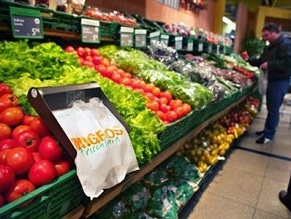|
World Jewish News

Will the EU impose the labeling of goods produced in the Israeli settlements ?
|
EU Mideast Envoy : Labeling of settlements goods will gain momentum if Israel-Palestinian talks fail
19.12.2013, Israel and the World According to outgoing EU Mideast Envoy, Andreas Reinicke, if peace talks between Israel and the Palesdtinians fail, he expects the EU to resume its discussions on labeling products from the Israeli settlements which would would allow consumers to decide if they want to buy or not such goods.
Reinicke said, in an interview with the Associated Press, that when he started in his post in February 2012, only two of 28 member states supported the idea of labeling. Now, 14 states are in favor, he said.
"There is movement in this direction," he said. Efforts on labeling were suspended because Europe is working closely with US Secretary of State John Kerry in trying to move the Israeli-Palestinian negotiations forward, he added.
The 28-member EU already bars goods produced in Israeli settlements from receiving customs exemptions given to Israeli goods and the EU issued new guidelines barring EU funds for Israeli institutions beyond the Green Line.
As part of its warning of "unprecedented steps" if peace alks fail, the EU alsdo threatened to halt its aid to the Palestinian Authority, the Palestinian self-rule government in the West Bank.
But Reinicke, a German diplomat who will leave his post at the end of thuis month, said that he believes a deal is possible and that the two sides "are starting to bridge the first gaps."
Earlier this week, the 28 EU Foreign Ministers offered Israel and the Palestinians what they called an ’’unprecedented’’ package of European political, economic and security support if both parties reach a final status agreement in peace talks they started in July.
They said the EU is ready in the event of a final peace agreement to offer Israel and the future state of Palestine a ‘’Special Privileged Partnership’’ including increased access to the European markets, closer cultural and scientific links, facilitation of trade and investments as well as promotion of business to business relations.
‘’Enhanced political dialogue and security cooperation will also be offered to both states,’’ the EU Foreign Ministers said in a statement issued after a meeting in Brussels.
by: Yossi Lempkowicz
EJP
|
|
